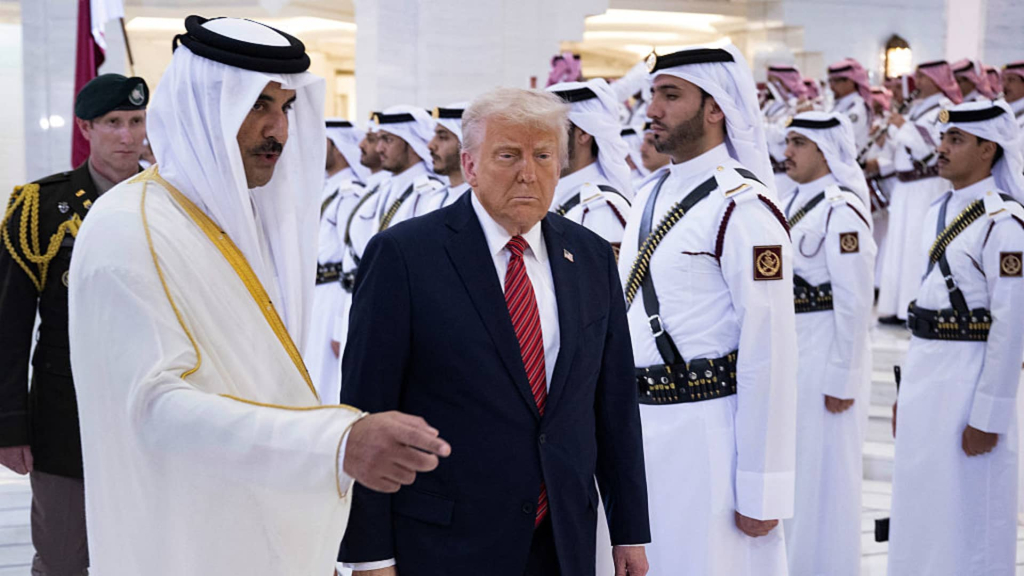ABU DHABI, United Arab Emirates — If a popularity contest were held among the Arab Gulf states, U.S. President Donald Trump would undoubtedly take the crown.
The 45th and 47th president of the United States received a warm and extravagant welcome during his four-day visit to Saudi Arabia, Qatar, and the United Arab Emirates.
In Riyadh, Saudi Crown Prince Mohammed bin Salman notably broke royal protocol to personally welcome President Trump on the runway. The motorcade that transported Trump from Hamad International Airport in Doha was flanked by striking red Tesla cybertrucks and a group of horse-mounted riders. In Abu Dhabi, UAE ruler Mohammed bin Zayed honored his American counterpart with the prestigious Order of Zayed Award, the highest civilian accolade in the nation.
In a spectacular display during his arrival, a procession of royal camels greeted Trump outside Qatar’s Amiri Diwan, the presidential office. Expressing his admiration to Qatar’s Emir Sheikh Tamim bin Hamad al-Thani, Trump remarked on the grandeur of the palace.
“As a construction guy, this is perfect marble,” he said, pointing to the palace’s intricate architecture. “This is what they call perfecto. We appreciate those camels,” he continued. “I haven’t seen camels like that in a long time. And really, we appreciate it very much.”
The visuals from the U.S. leader’s Middle East trip were striking, reflecting the grandeur of the affluent petrostates and their willingness to invest significantly in fostering robust relations with the United States while pursuing their own economic ambitions.
The figures announced during the visit were historic; Qatar and the U.S. agreed to an immense $1.2 trillion “economic exchange.” Saudi Arabia pledged $600 billion in investments in the U.S., and substantial agreements were made with the UAE, which established a 10-year, $1.4 trillion investment framework following a meeting with Trump in March.
Despite these ambitious numbers, questions linger regarding their feasibility, especially amid a backdrop of declining oil prices and shrinking revenues for oil-dependent nations. Additionally, major deals, such as Qatar’s unprecedented order for 210 Boeing jets and a historic $142 billion arms transaction with Saudi Arabia — the largest arms deal ever signed — may take considerable time to materialize.
Nevertheless, Gulf states are signaling their desire for a foremost partnership with the U.S. across business, military, and technological sectors.
“The Gulf has always fared better with presidents who prioritize business, and President Trump exemplifies that perfectly,” Tarik Solomon, chairman of the American Chamber of Commerce in Saudi Arabia, told Finance Newso.
“He embodies fast money, substantial defense, and access to American technology. If building ties with him secures a place at the table in the emerging world order, the Gulf is positioning itself for a prominent role,” he added.
Some analysts have suggested that the three Gulf nations are vying for Trump’s favor, but many regional observers argue it reflects a wider, strategic alignment.
“I do not interpret the major economic announcements as a competition among the three countries; instead, they illustrate a race against other regions, such as Europe, for closer ties with the U.S. administration,” stated Ahmed Rashad, an assistant professor of economics at the Economic Research Forum in Abu Dhabi.
“The economic agreements seem essential for enhancing the appeal of the Middle East visit. Ultimately, the main goal of the GCC [Gulf Cooperation Council] nations appears to be fortifying bonds with the U.S. while securing access to advanced technologies,” Rashad remarked.
The camaraderie was particularly evident in Saudi Arabia, where President Trump and Crown Prince Mohammed bin Salman lavished praise on one another during the U.S.-Saudi Investment Summit. The gathering, hosted at the opulent Ritz-Carlton in Riyadh, attracted numerous leading American CEOs, including Elon Musk of Tesla, Jensen Huang of Nvidia, and Larry Fink of BlackRock.
Meanwhile, in the UAE, Trump and Emirati leader Mohammed bin Zayed celebrated their personal bond and the longstanding alliance between their nations. This visit marked the first by a sitting U.S. president to the UAE since George W. Bush’s trip in 2008.
The palpable warmth and mutual compliments stood in stark contrast to interactions involving officials from the Biden administration, which have been characterized by tension.
The UAE appears to be benefiting from this change in approach, as reports indicate that the U.S. has reached a preliminary agreement allowing the UAE to import 500,000 of Nvidia’s premier H100 chips annually for the first time. This move would significantly advance the UAE’s capability to build data centers necessary for powering its AI models.
“Trump’s visit to the Gulf underscores the growing personalization of geopolitics,” noted Taufiq Rahim, principal at 2040 Advisory and author of “Trump 2.5: A Primer.”
“Regional leaders have responded accordingly, orchestrating ornate displays for the visiting president. Flattery and mutual accolades are becoming increasingly crucial to the announcement and substance of agreements,” he added.
Looking ahead, Rahim questioned the sustainability of the investments being made.
“For instance, how many data centers will actually be needed? The drive to have the ‘largest’ facilities might inadvertently lead to an oversupply in certain sectors,” he warned.
Despite potential challenges, the American Chamber of Commerce’s Solomon believes that ambitious commitments are still a sound strategy; whether or not every dollar materializes over the coming years can be addressed later.
“Certainly, a lot of it is theater,” he acknowledged. “However, in this region, signaling ambition is a crucial aspect of the game. Even if only half of the initiatives succeed, it still represents a meaningful impact.”
























